Get ready for a flavorful journey as we dive into the world of freshly fermented foods and pickles. Fermented foods are those that have gone through fermentation, a process where natural bacteria or yeast break down sugars and create beneficial compounds.
Examples include yoghurt, sauerkraut, kimchi, kombucha, and pickles. People make pickles by soaking fruits or vegetables in salt water or vinegar as a type of fermented food. These tangy foods are rich in probiotics, vitamins, and minerals.
We’ll explore the art of fermentation and the process behind creating these mouthwatering delights. And let’s not forget about the amazing health benefits of indulging in these probiotic-packed goodies. So grab a jar of your favorite pickle and join us on this flavorful adventure.
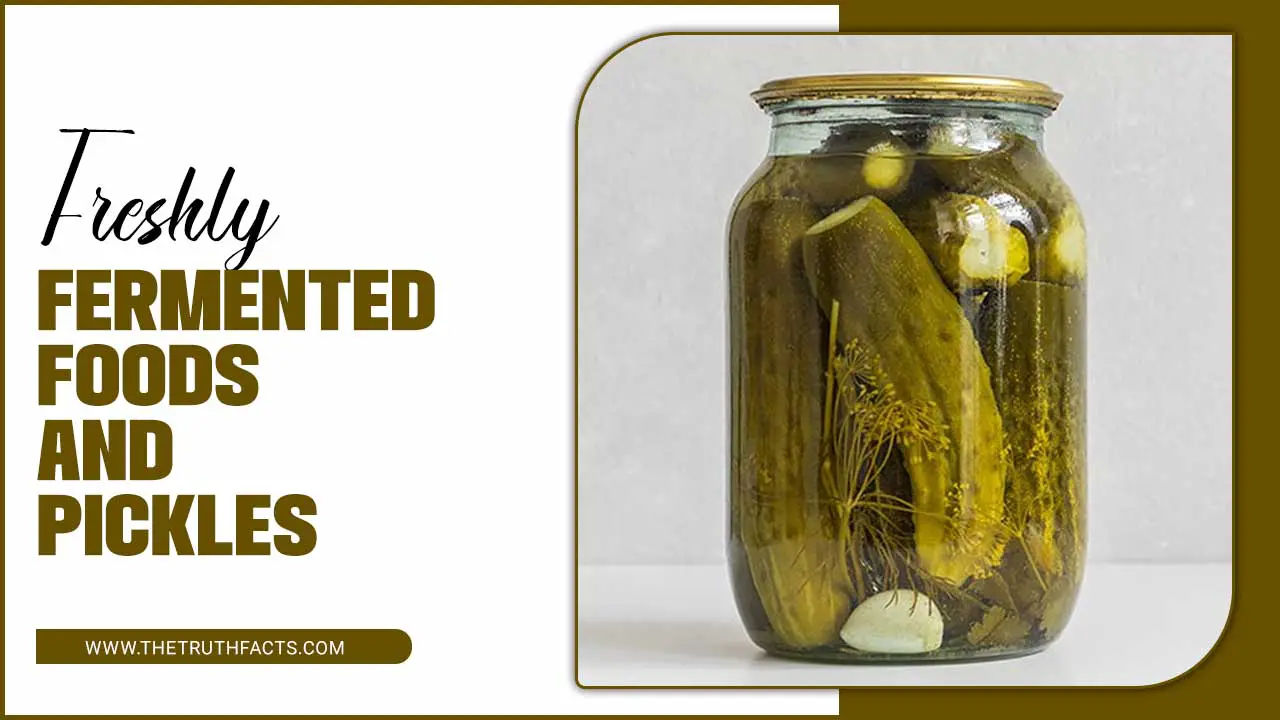
All About Freshly Fermented Foods And Pickles
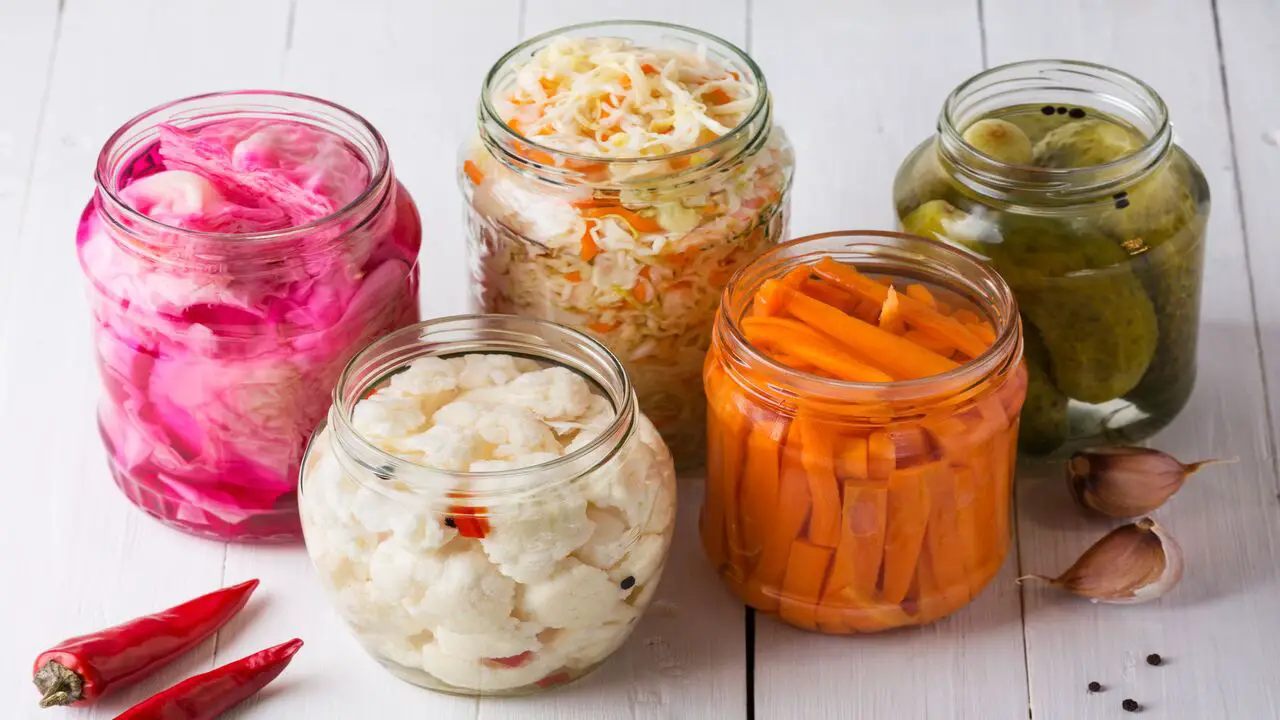
People know freshly fermented foods and pickles for their tangy flavours, and they contain probiotics, vitamins, and minerals. The process of fermentation involves the breakdown of sugars in the food by natural bacteria or yeast, producing beneficial compounds. Examples of fermented foods include yoghurt, sauerkraut, kimchi, kombucha, and pickles. People make pickles by soaking fruits or vegetables in salt water or vinegar as a type of fermented food.
Including fermented foods and pickles in your diet can provide numerous health benefits. Fermented foods are rich in probiotics, which promote a healthy gut and boost the immune system. They also have increased nutritional value due to fermentation, making certain nutrients more readily available.
Plenty of resources and recipes are available to guide you if you’re interested in making fermented foods and pickles at home. You can experiment with different ingredients and flavours to create unique combinations that suit your taste preferences. Adding fermented foods and pickles to your meals greatly enhances your dishes’ flavour and nutritional profile.
Different Styles Of Pickles
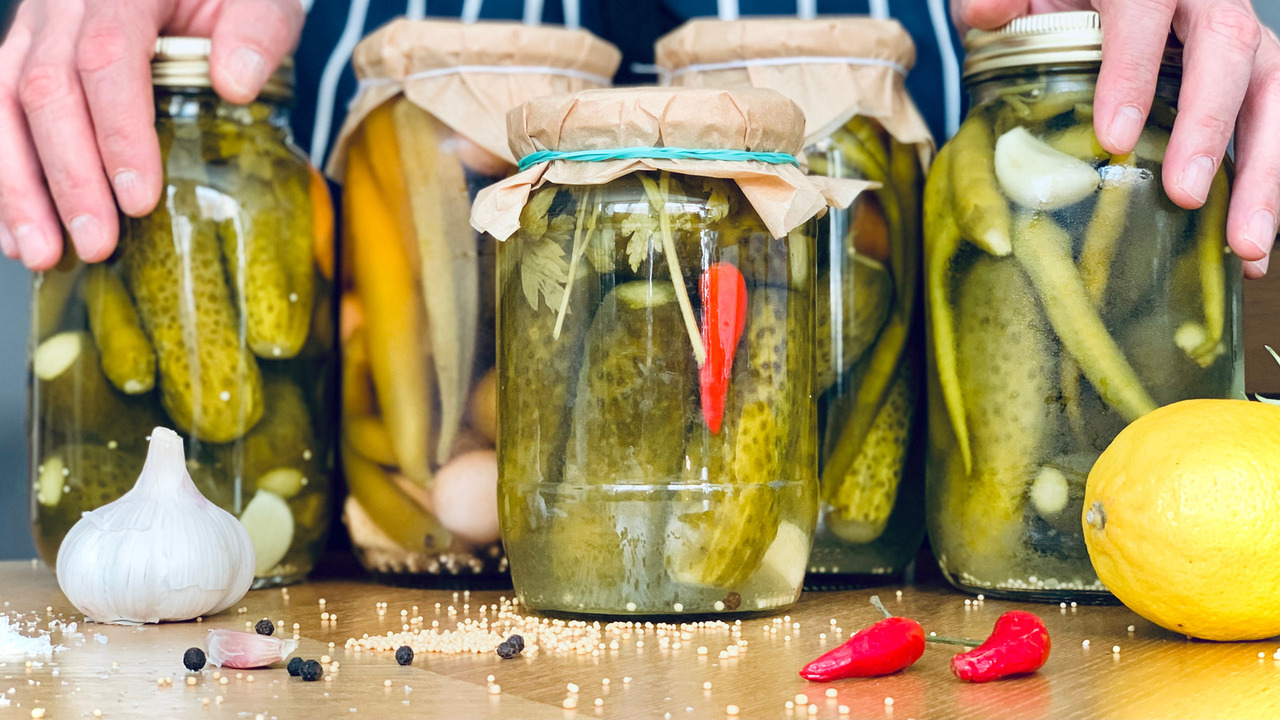
Pickles come in various styles worldwide, each offering unique flavours and ingredients. From tangy dill pickles to spicy kimchi, there is a pickle to suit every taste. Fermentation, the process behind these flavorful treats, involves beneficial bacteria, yeasts, or moulds transforming and preserving the food. Let’s explore some popular styles of pickles and their distinct characteristics.
Dill pickles, known for their crisp texture and savoury taste, are a classic choice. They undergo fermentation by soaking cucumbers in a brine solution infused with dill, garlic, and other spices. Bread and butter pickles, on the other hand, have a sweeter profile.
Someone makes them using cucumbers, onions, sugar, vinegar, and a blend of spices. These pickles add a touch of sweetness to sandwiches or salads.
Kimchi, an iconic Korean dish, is a fermented vegetable pickle. Its spicy and tangy flavor is achieved by fermenting vegetables like cabbage, radish, onion and seasonings like chili powder, garlic, and ginger. Sauerkraut, another popular pickle, is made from fermented cabbage. Its tangy and sour taste is commonly enjoyed as a topping for hot dogs and sausages.
Storing And Serving Pickles
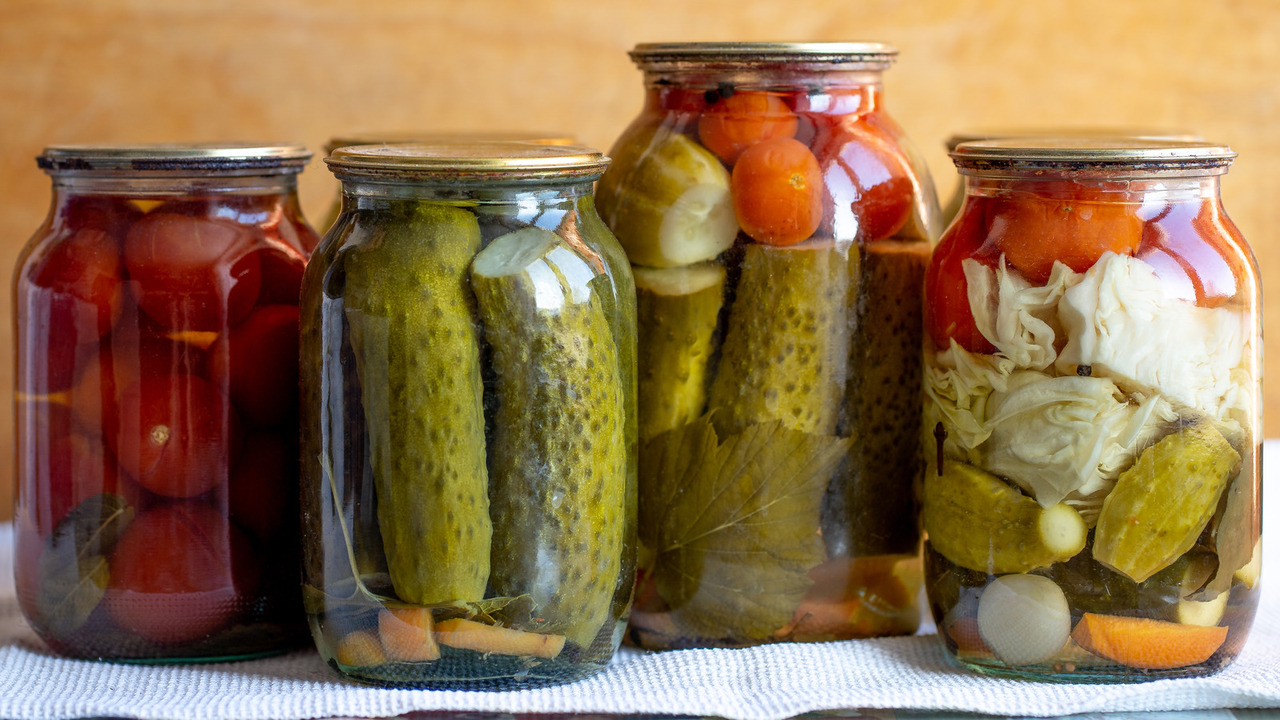
Proper storage is key to maintaining the quality and flavor of pickles. Store your pickles in a cool, dark place like a pantry or cellar to ensure they stay fresh and crisp. Keeping them in airtight containers is important to prevent spoilage and maintain their crunchiness. When serving pickles, they can enjoy as a flavorful side dish, added to sandwiches or burgers for an extra kick, or used as a tasty ingredient in various recipes.
With their tanginess and crunch, pickles are a versatile condiment that can enhance the flavor of any meal or snack. Whether you prefer dill pickles, cucumber pickles, or sour pickles, proper storage and serving methods will ensure their longevity and flavor.
So, make sure to keep your pickle jar airtight and stored in a cool, dark place. Pickles are a delicious accompaniment to meals and a healthy option as they are low in calories and nutrients. Enjoy the tangy goodness of pickles while boosting your calcium intake, promoting gut health with probiotics, and relishing the flavors of various spices and seasonings.
Top 6 Fermented Foods For A Healthy Diet
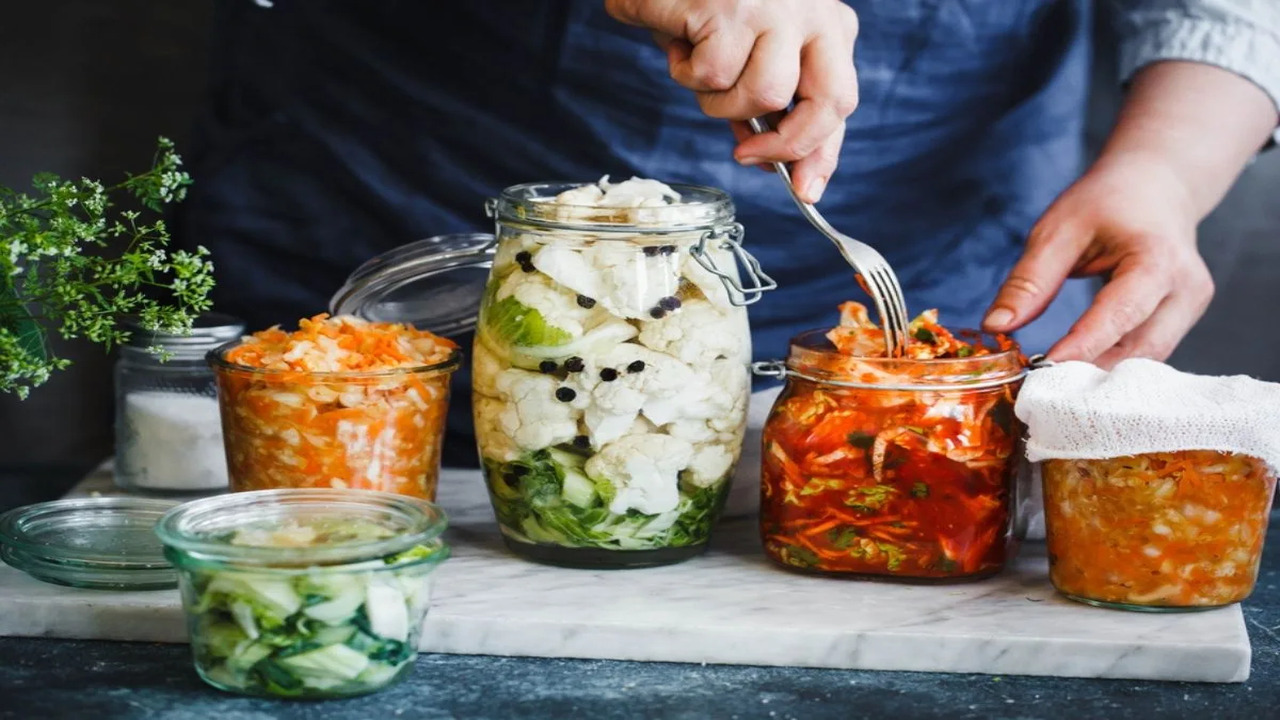
Fermented foods have gained popularity not only for their unique flavors but also for their numerous health benefits. Incorporating these foods into your daily meals can support your gut health and overall well-being. Here are six fermented foods you should consider adding to your diet:
1.Kefir
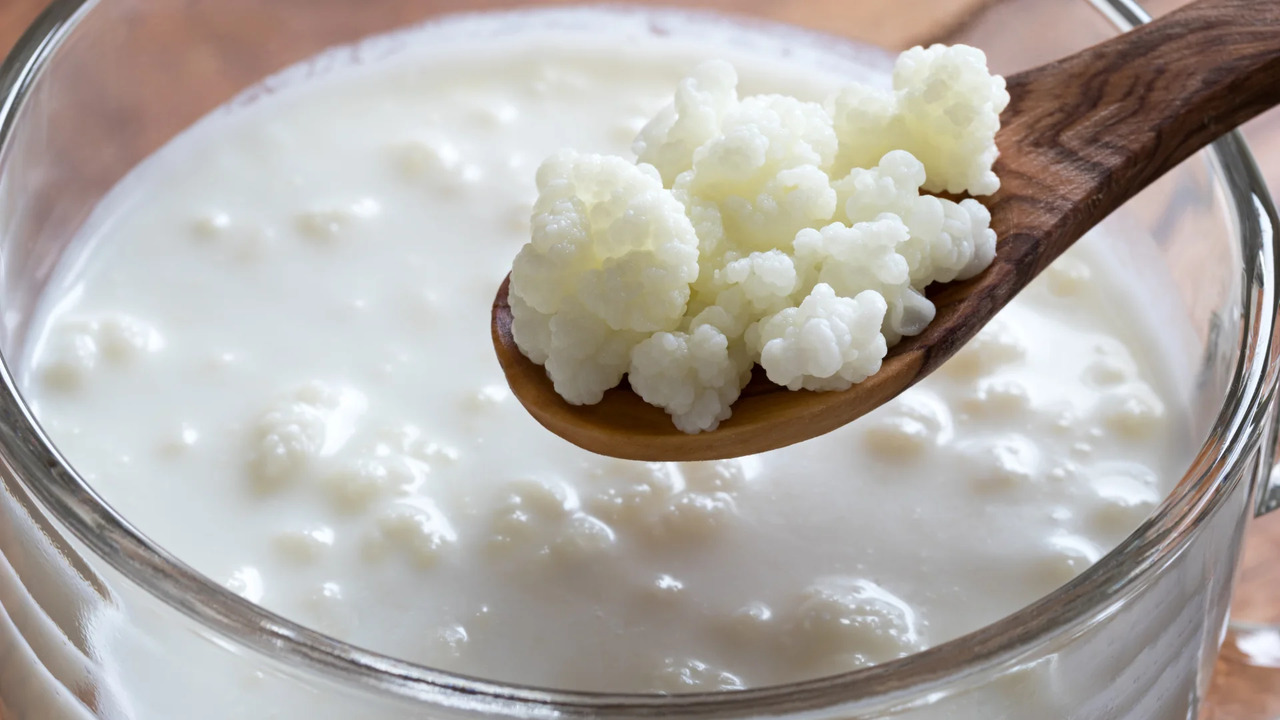
Kefir packs probiotics, beneficial bacteria, and essential nutrients in a tangy, creamy, fermented milk drink. It, a result of adding kefir grains to milk and allowing it to ferment, offers numerous health benefits, including improved digestion, strengthened immune system, and increased nutrient absorption.
With its rich flavor and creamy consistency, kefir can enjoy on its own or used as a versatile ingredient in smoothies, dressings, and recipes. With its tangy and creamy taste, this freshly fermented food is a great alternative to yogurt and provides a delicious way to support your gut health and overall well-being.
2.Kombucha

Kombucha, the probiotic-packed fermented tea beverage, is a beloved choice among health enthusiasts. This tangy and effervescent concoction, created by fermenting sweetened tea with a symbiotic culture of bacteria and yeast (SCOBY), brings a delightful twist to traditional teas.
With its rich blend of beneficial bacteria and yeasts, this fizzy drink can help promote a healthy digestive system and boost immune health. Kombucha’s slightly tangy flavor, combined with its effervescent nature, makes it a versatile drink that can enjoy on its own or serve as a base for flavorful cocktails or mocktails. Consider adding kombucha to your beverage repertoire for a refreshing and probiotic-infused treat.
3.Sauerkraut
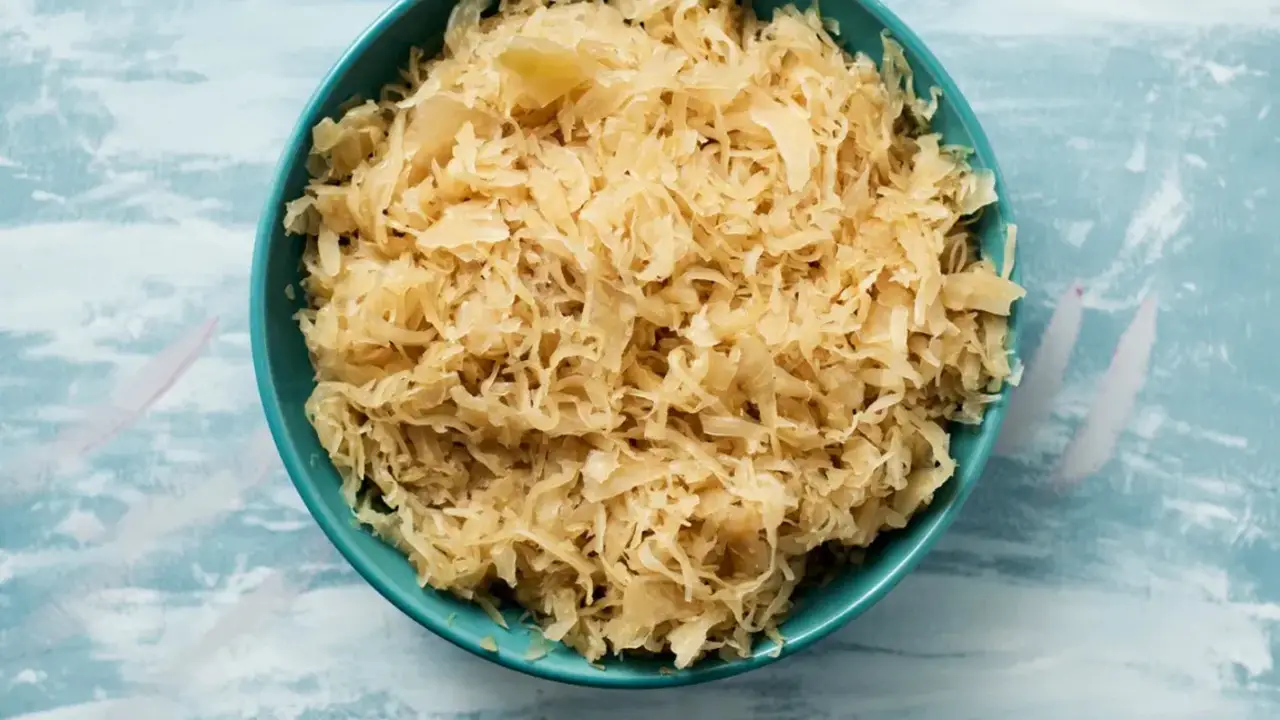
Sauerkraut, a classic fermented cabbage dish, brings a tangy and flavorful punch to any meal. Fermentation involves shredding cabbage and combining it with salt, resulting in a probiotic-rich and vitamin-packed delight.
This traditional dish offers a tangy explosion and numerous digestive health benefits due to the growth of beneficial bacteria during fermentation. Sauerkraut is a nutritious and tasty addition to a well-rounded diet, packed with vitamin C, fibre, and antioxidants. Explore the versatility of sauerkraut by incorporating it as a delightful side, or amp up the texture and taste of your sandwiches and salads.
4.Pickles

Pickles, a beloved fermented food, are a tangy and flavorful addition to any meal. These popular treats are made by soaking cucumbers or other vegetables in a brine solution, resulting in a fermentation process that leads to their distinct tangy taste. Pickles are known for their probiotic properties, thanks to the beneficial bacteria that develop during fermentation.
With their low-calorie content and high nutritional value, pickles are a wise choice for those looking to enhance their health. These crunchy delights are rich in vitamins and minerals, including vitamin K and potassium, which can contribute to a balanced diet. Whether enjoyed on their own as a snack, added to sandwiches or salads, or used as a condiment, pickles can elevate the flavor profile of any dish.
5.Miso
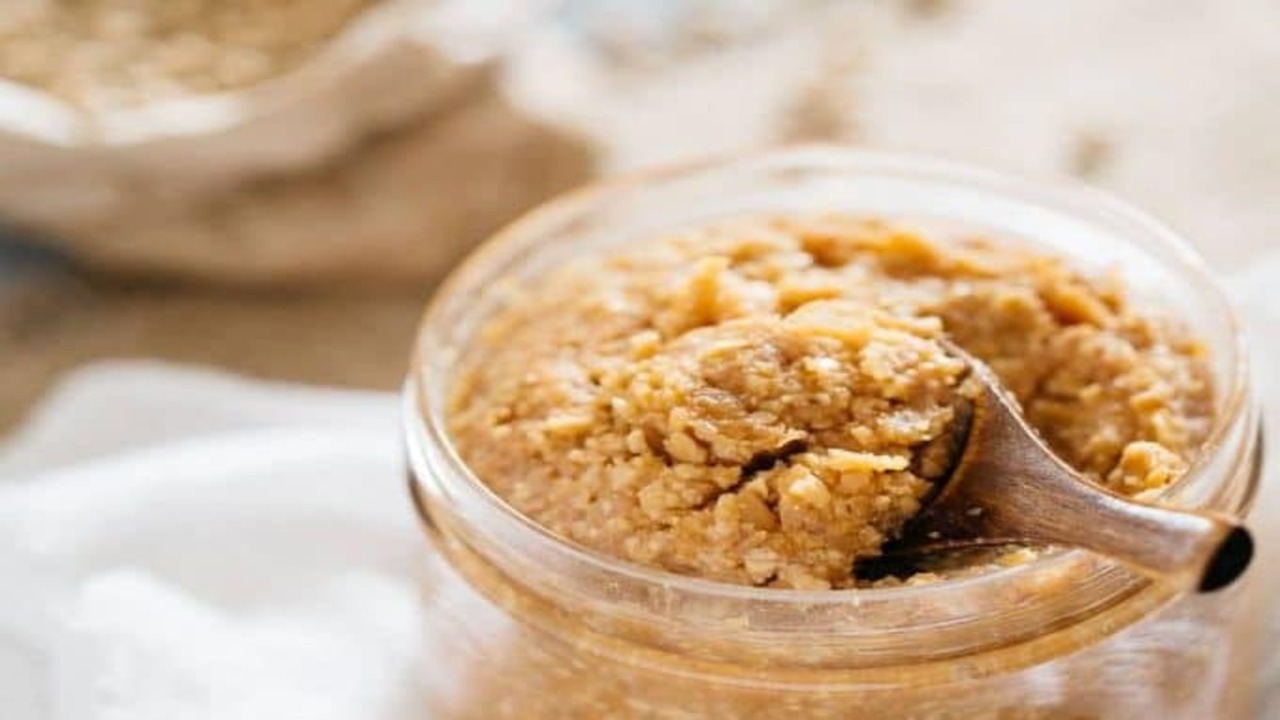
Miso, a traditional fermented food hailing from Japan, adds a rich umami flavor to numerous dishes. Crafted from soybeans, rice, or barley, it combines with salt to create a symphony of taste. Overflowing with enzymes, beneficial bacteria, and abundant protein, vitamins, and minerals, miso supports improved digestion, bolsters immune function, and enhances gut health.
Embrace the diversity within miso by exploring various types, including the white, yellow, and red varieties. Unleash the magic of miso in soups, marinades, dressings, and more as it paints your culinary creations with a tantalizing hue of taste.
6.Tempeh

Tempeh, a traditional Indonesian food, is a delicious and nutritious fermented soybean product. This versatile ingredient is known for its nutty flavor and firm texture, making it a favorite among vegetarians and vegans. Whether it’s sliced, marinated, grilled, or crumbled and used as a meat substitute in stir-fries and tacos, tempeh adds a unique touch to any dish.
Packed with protein, iron, calcium, and B vitamins, tempeh is a great source of essential nutrients and supports a healthy gut with its beneficial bacteria. By incorporating tempeh into your diet, you can enjoy improved digestion, enhanced immune function, and overall gut health.
Health Benefits Of Freshly Fermented Foods & Pickles
Incorporating freshly fermented foods & pickles into your diet provides many health benefits. These tangy and flavorful creations offer many advantages for your overall well-being. Adding pickles and fermented foods to your meals can support your gut health, improve digestion, increase nutrient absorption, boost your immune system, reduce inflammation, and potentially aid in weight management.
Fermentation introduces beneficial bacteria and enzymes into the food, promoting a healthy balance of gut bacteria and making it easier to digest. Moreover, it enhances the bioavailability of nutrients, allowing your body to absorb vitamins and minerals better. The probiotics in fermented foods strengthen your immune system, helping combat infections and diseases.
Additionally, the beneficial enzymes and antioxidants found in fermented foods help reduce inflammation within the body. Furthermore, some studies suggest that consuming fermented foods may assist with weight loss or maintenance. You can enjoy their many health benefits by incorporating fermented foods and pickles into your diet.
Tips For Making The Perfect Fermented Foods And Pickles
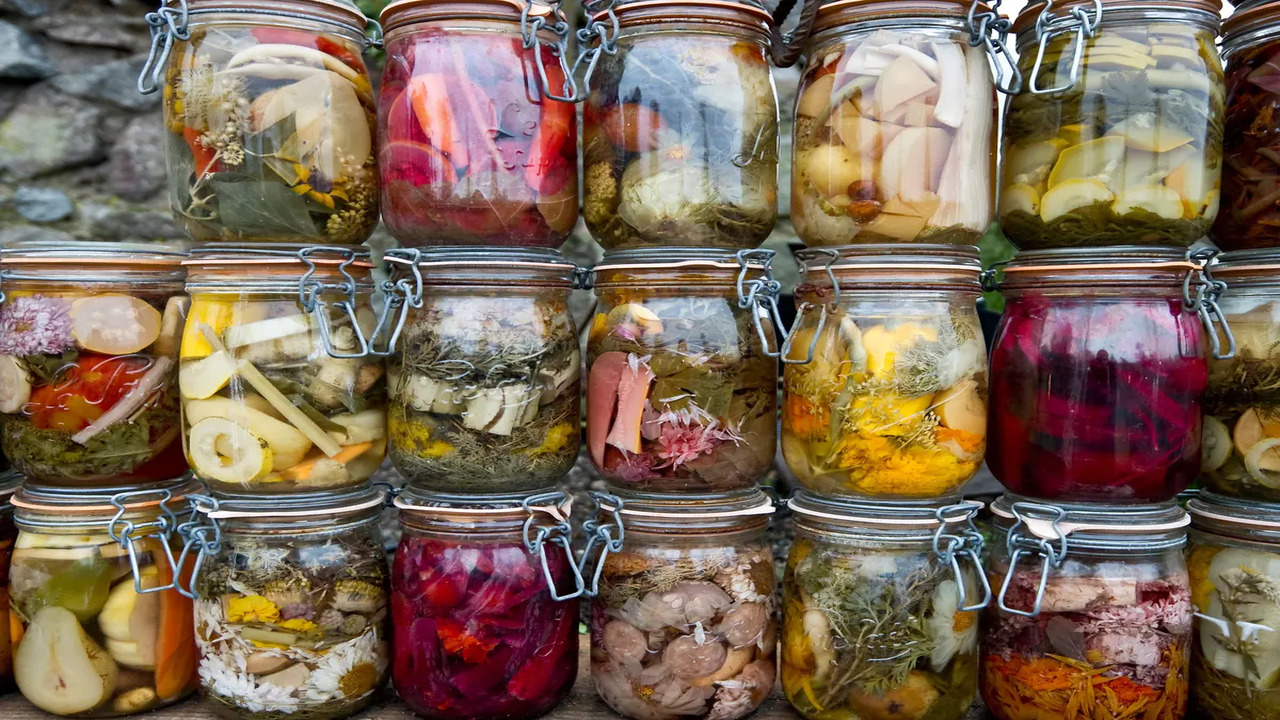
It is crucial to follow these helpful tips to create the perfect fermented foods and pickles. To start, prioritize the use of fresh and high-quality ingredients. This will contribute to the overall flavor and quality of your final product. Additionally, pay attention to the creation of your brine.
Use the right amount of salt and water to achieve the desired level of acidity and ensure a successful fermentation process. When choosing a fermentation vessel, opt for glass jars or ceramic crocks, as they provide the ideal environment for fermentation. Allow enough time for your foods to ferment, enhancing the flavors and textures.
Make sure to taste and test your creations along the way regularly. This will help you achieve the desired tanginess and ensure your fermented foods progress as planned.
Lastly, consider the proper storage of your fermented foods. Keep them in a cool, dark place, slowing fermentation and prolonging their shelf life. By following these tips, you will be well on your way to creating delicious and healthy fermented foods and pickles.
Conclusion
Freshly fermented foods and pickles are delicious and offer numerous health benefits. From supporting gut health to boosting the immune system, these flavorful creations can enhance your overall well-being. Whether you’re a fan of sauerkraut, pickles, kefir, kombucha, miso, or tempeh, incorporating these fermented foods into your diet can be a game-changer.
Fermented foods are rich in probiotics, which promote a healthy gut and boost your immune system. They are also packed with vitamins and minerals that support overall wellness. Whether you’re new to fermenting or a seasoned pro, incorporating these foods into your daily routine is a simple way to improve your health and enjoy their unique flavors.
Frequently Asked Questions
1.Can You Can Pickles After Fermentation?
Ans: No, we do not recommend canning pickles after fermentation. People usually store fermented pickles in a cool, dark refrigerator. Canning can change the texture and taste of fermented pickles.
2.Do Pickles Count As Fermented Foods?
Ans: Fermented foods include pickles. They undergo lacto-fermentation, which gives them their tangy and sour taste. Eating pickles can provide probiotics and other health benefits commonly associated with fermented foods.
3.Are Pickles And Olives Considered Fermented Foods?
Ans: Yes, pickles and olives can be classified as fermented foods. Through fermentation, the sugars in cucumbers or olives are converted into lactic acid, enhancing their taste and prolonging their shelf life. Eating fermented foods like pickles and olives can offer probiotics and other health advantages.
4.Are Refrigerator Pickles Considered Fermented?
Ans: No, we do not consider refrigerator pickles as fermented. They are made by placing cucumbers or vegetables in a vinegar-based brine and storing them in the fridge. Fermented pickles, on the other hand, are made through lacto-fermentation by submerging cucumbers in a saltwater brine and allowing them to ferment at room temperature.
5.What Do Lacto-Fermented Pickles Taste Like?
Ans: Lacto-fermented pickles have a tangy and sour flavor with a unique depth of taste due to the fermentation process. They may also have a slightly effervescent texture. The specific taste can vary depending on the spices and herbs used in the brine, adding extra flavors to the pickles.

I’m a writer and blogger who loves to talk about entertainment, culture, and relationships. I love to share my thoughts and insights on these topics, and I’m always looking for new ways to engage with my readers. I’m also a big fan of learning new things, so I’m always exploring new areas of interest.

